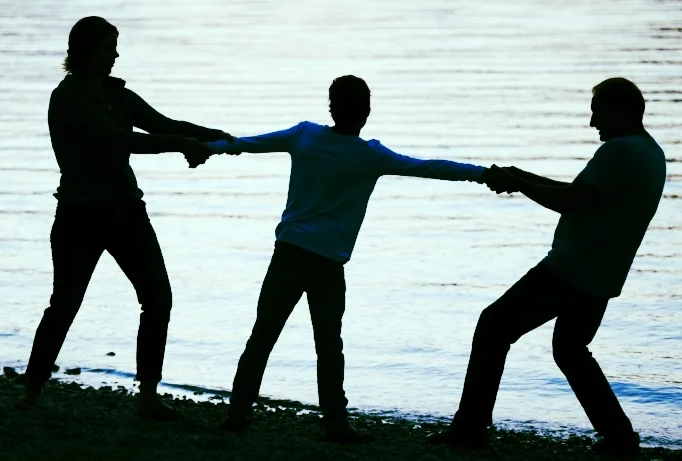When Parents Don't See Eye-to-Eye About Sex-Ed
/How do we co-parent when it comes to sex education?
It goes without saying that parenting is hard. Parenting a child from two different households can make things even more complicated, especially when the co-parents don’t always agree on what is age appropriate for their child. This can be particularly delicate when the topic of age-appropriate sex education comes up. In my experience as a sex educator, the “how young is too young?” type of question is often the first question parents have about their children's sexual education.
Recently a friend of mine, Elle*, who is co-parenting a 5 year old daughter with her ex-husband, Ben, reached out to me for advice. Camille lives part-time with Elle and part-time with Ben, his new wife, and teenage step-son. Elle has been teaching Camille about sexuality and anatomy for some time (using the age-appropriate best selling book that I recommended**). Her ex-husband, Ben, sent her an email expressing concerns with what Camille was learning. Ben said that both he and his current wife had heard Camille tell them things that he didn’t feel were appropriate for someone her age to know. Specifically, Ben was concerned that Camille knew that babies are sometimes born through the vagina and that it takes an egg and sperm to make a baby. He also expressed concern that Camille knew that sometimes a mom “could have to have her belly cut open to get the baby out.” Ben was “all for” his daughter being a well-educated kid and learning about anatomy, but he didn’t feel like she was anywhere close to being old enough to learn about reproduction and childbirth. He also expressed concern that Camille might repeat what she learned in school as casually as she had shared this info with him and his wife.
Even though Elle and Ben try their best to co-parent Camille, they are not really friendly and don’t talk much. Elle doesn't want to create drama, but she really feels like she is doing the right thing by educating Camille about anatomy and reproduction. She didn't teach Camille anything that is factually inaccurate, slang, or derogatory. Multiple people in Camille’s life have had babies (either vaginally or via C-section). Elle’s sister had recently lost a pregnancy in the third trimester and had to have a c-section. Camille had a lot of questions and Elle answered them honestly, but this clearly brought up a co-parenting challenge.
I was so glad that Elle reached out to ask for help. We talked through the situation and I encouraged her to have further communication with Ben about it. Elle drafted an email response that was clear and firmly stated her beliefs, but did not seem hostile. Here is some the advice that came out of our conversation.
Advocate for your position
I validated Elle’s choices about educating her child. I honestly agree with her and trust that she has her daughter’s best interest in mind. I reassured Elle that teaching children fact-based information about how our bodies work and how we are made, born, and grow builds confidence, self-esteem, self-awareness and body autonomy. Not only are these things important in healthy relationships, but all of these are elements that are key in physical boundary setting, consent, and preventing sexually abusive situations. Additionally, when factual information about our bodies is taught to children accurately by their parents, it helps build trust in the parent-child relationship. I encouraged Elle to advocate for herself and her daughter by clearly explaining her choices and the reasons behind them.
Acknowledge your co-parent’s concerns
I reminded Elle that Ben is trying his best to be a good dad. His email shows concern, and that is coming from a place of love. Ben is clearly worried about Camille for her sake. He may be worried about the embarrassment Camille might cause for herself, but also for him and his wife, if she shared what she learned with others. It is important for Elle to acknowledge that she knows that his concerns are coming from a desire to do what is best for Camille and remind him that she wants that, too.
I encouraged Elle to point out the areas where she might agree with his concerns and try to reassure him whenever possible. I know both Elle and Ben certainly don’t want Camille becoming the sex educator of her Kindergarten class, she definitely isn’t ready for that. Elle can reassure Ben that she has had conversations with Camille about not sharing information about bodies and reproduction with other kids at school because different families learn about this in different ways. In addition to the facts, Camille was also taught that it is important that kids learn these things from trusted adults. These are things that Ben may need a few reminders and reassurances about. Even if they don’t end up agreeing on what Camille should learn, and at what age, it is important they both feel like their concerns about this sensitive topic are heard.
Share the resources
Science isn’t always perfect and experts often disagree, however I told Elle to let Ben know that the books she is using to teach Camille are backed by evidence. I asked her to consider buying Ben and his wife a copy (or lending him hers). Many of the children’s books on anatomy, sex, and reproduction contain information for parents and information about other resources. I think Ben and his wife may feel more comfortable once they can see the information laid out in a child-friendly, accessible, and age-appropriate way.
Invite further conversation
This is definitely not the only time this will come up. Camille will have questions about her body, reproduction, puberty, sex, and pleasure as she grows up. There maybe points where Elle and Ben disagree about what is appropriate to talk about. It is important that they keep in communication about these topics, especially if they disagree, and never make Camille feel like she has to keep secrets about what she is learning from either parent.
After all the advice, I reassured Elle that she is a great parent, regardless of how Ben responds to her email. She has good instincts, especially in challenging moments. Camille is a kind-spirited, fun-loving kiddo. I can already see Camille’s confidence and good self-esteem shining through when she expresses herself through her brightly colored clothes, her “try anything” attitude, and her acrobatic moves. Elle is a rocking this mom thing and I am really proud of her.
*Names have been changed to protect anonymity.
Resources
Harris, Robie & Michael Emberley. It's Not the Stork!: A Book About Girls, Boys, Babies, Bodies, Families and Friends (The Family Library). Massachusetts: Candlewick Press, 2008. Print.
Harris, Robie & Michael Emberley. It's So Amazing!: A Book about Eggs, Sperm, Birth, Babies, and Families (The Family Library). Massachusetts: Candlewick Press, 2014. Print.
Harris, Robie & Michael Emberley. It's Perfectly Normal: Changing Bodies, Growing Up, Sex, and Sexual Health (The Family Library). Massachusetts: Candlewick Press, 2014. Print.
Mayle, Peter & Arthur Robbins. Where Did I Come From? New York: Kensington Publishing, 2000. Print.
Silverberg, Cory & Fiona Smyth. What Makes a Baby. New York: Zoball Press. 2013. Print
J. Robin Darling holds a Master’s in Sexuality Studies (2011) from San Francisco State University and a Bachelor’s degree in Sociology (2004) from the University of California, San Diego. Robin started out as a peer sexual health educator in high school and has worked in the field of sexuality education for 20 years through various organizations. Currently, she does independent contract workshops and seminars relating to sexual health and LGBT issues.



